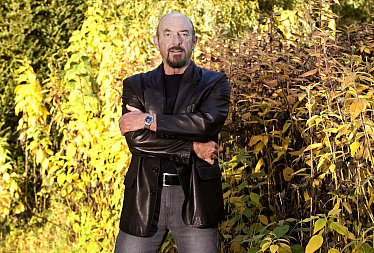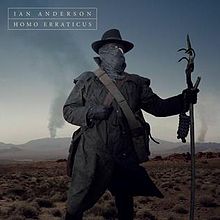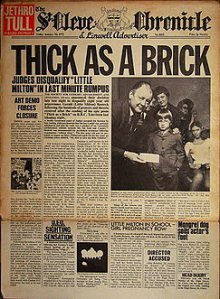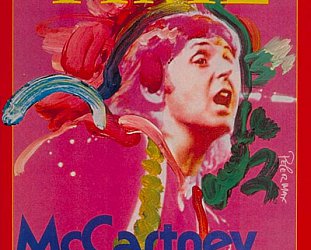Graham Reid | | 13 min read
Ian Anderson: Doggerland

That man could talk and talk and talk . . .
Without a word of lie I can say this, as he went on and on about how fans demanded all the reissues and whatever, I got up and asked my wife if she could make m a cup of tea then went back to the phone and he was still talking.
The reason for the call at that time – when very few could name one of the previous five Tull albums – was because the band was coming to New Zealand to play a show in New Plymouth organised by the Magog motorcycle club.
He was such a crashing bore though that I said to myself – and put in print here – “never again”.
And so “never again” rolled around again because in December this year Anderson is coming back touring a show billed as “The Best of Jethro Tull presented by Ian Anderson”.
So I rang him and he started by saying, “no pleasantries, first question” and away we went. He talked and talked and talked . . .
At one point I wrote a quick e-mail to a mate confirming a boozy lunch on Friday.
But Anderson was also very interesting as you may see from what follows, and he spoke at length about his two Thick as a Brick albums, and the new one Homo Erraticus which has appeared under his own name.
I've edited out the bit at the end where – after talking over the guy trying to tell him our half hour was up – he got into something about flying, a volcano in Iceland exploding and . . .
Enough. Back to the beginning.
The last time you came to New Zealand was in 93 at the invitation of Shagger from the Magogs?
Yes, he was the organiser of a biker festival and we were asked to go and do that, and he did book us again in 96 but I had an injury onstage and ended up in hospital in Sydney with a life threatening illness so the Australian and New Zealand shows had to be cancelled. I nearly died.
But they put on a well-organised festival.
I've played at few biker festivals over the years and a few hippie ones as well, but festivals are not my thing. I'm really a concert guy, places where the toilets are indoors. People can hear us now and see us now and you are not subject to weather conditions.
The flute reasonably resilient and I have these tiny condenser mikes which make me the loudest flute player in the world, but they can fail in high humidity making me the quietest flute player in the world. So I usually have to carry three or four spares for outdoor shows in summer.
Worse though is I am not a happy flier so should the flying weather be bad in December it can get a little scary for me, I'm very claustrophobic in airplanes and 22 hours of turbulence is not something I find easy to cope with.
That can damage my psyche.
I travel in the morning in order to beat the afternoon thunderstorms in the mid-west of America, but it's what we do and these days I seem to be a part-time travel agent.
Ian, I'm curious about how you bill yourself these days, sometimes it is Jethro Tull, sometimes Ian Anderson and for your concerts in New Zealand it is 'The Best of Jethro Tull by Ian Anderson'.
 Since 1968 when the band was given the
name by our agents and I found out shortly afterwards he'd named us
after a dead guy who'd invented seed drill back in the 18th
century and that was something I didn't feel great about then and
over the years have felt more guilty about identity theft, and it
can't be very original taking on a historical characters name.
Since 1968 when the band was given the
name by our agents and I found out shortly afterwards he'd named us
after a dead guy who'd invented seed drill back in the 18th
century and that was something I didn't feel great about then and
over the years have felt more guilty about identity theft, and it
can't be very original taking on a historical characters name.
However it was the name that came up . . . and the logo of me standing on one leg playing the flute have become ingrained and are in eight out of the top 10 Google searches for Jethro Tull.
 So [the name] is not something I want
to get rid of, and nor do I as I'm pretty proud of most of the 350
songs I've recorded, engineered and produced, and the 28 members of
the band I've played with over the years and is part of an extended
family of musicians which is part of the fabric of the catalogue and
history of Jethro Tull consists of. So it's not something I am going
to wish away, but I would just like to sail into the sunset
tentatively hoisting the flag that says 'Ian Anderson' on top of the
masthead, just so you know I was the guy playing the flute, it wasn't
Jethro or Mr Tull.
So [the name] is not something I want
to get rid of, and nor do I as I'm pretty proud of most of the 350
songs I've recorded, engineered and produced, and the 28 members of
the band I've played with over the years and is part of an extended
family of musicians which is part of the fabric of the catalogue and
history of Jethro Tull consists of. So it's not something I am going
to wish away, but I would just like to sail into the sunset
tentatively hoisting the flag that says 'Ian Anderson' on top of the
masthead, just so you know I was the guy playing the flute, it wasn't
Jethro or Mr Tull.
For the simple Jethro Tull repertoire I use the name Jethro Tull but if its more of a project of more complexity – like if its an orchestral show or a string quartet or acoustic show, or a concept album in its entirety – then I will tend to use my own name because it signals to an audience this is not just the 20 best known Jethro Tull songs of all time.
So some may choose, perhaps wisely, to stay at home rather than have their delicate ears assaulted by the latest prog-rock extravaganza of which I am intensely proud but they might find intensely boring.
Homo Erraticus, you still find a place for prog-rock expression, but you said the process of writing filled you with terror, you mentioned the 'muse'?
 It's an imaginary inspirational source
which descends on writers in the middle of writer's block suddenly
receive a message from the unknown and think 'Whoopee, this is going
to be my seller after all'. Of course it is a notional inspiration
and not for me to sit and wait for the muse to drop in for a cup of
tea, it's up to me to go looking for the muse. I say, 9am January 2,
2013 I am going to go to work, just like people get up and go to
work. The best way to get rid of those Monday morning blues is just
get on with it.
It's an imaginary inspirational source
which descends on writers in the middle of writer's block suddenly
receive a message from the unknown and think 'Whoopee, this is going
to be my seller after all'. Of course it is a notional inspiration
and not for me to sit and wait for the muse to drop in for a cup of
tea, it's up to me to go looking for the muse. I say, 9am January 2,
2013 I am going to go to work, just like people get up and go to
work. The best way to get rid of those Monday morning blues is just
get on with it.
You usually find if you put yourself in that work sentiment with a motivation which hopefully comes after the first cup of coffee.
The muse is a deadline?
For me it's good to have a deadline because for me I have other things in my diary so can't just drift into the future aimlessly. You know you're going to have to work back from that date some time in the future, so I knew it would be mid 2015 before we finish doing the Homo Erraticus tours, although I should add that is not the show we are doing in New Zealand.
I thought chances are we won't be [coming to New Zealand] again, so we'll focus the first part of the show on Thick as Brick as it was written and recorded in '72, then toss in some things from Thick as a Brick 2 [released in 2012]. The second half of the show is broadly speaking the best of Jethro Tull for an hour and 15 minutes.
We missed out the Thick as a Brick production because we didn't come to New Zealand on the last couple of tours, so I thought it would be a good thing to do since we when came to New Zealand in 1972 that was a Thick as a Brick tour, and one of the relatively few tours where we played all of Thick as a Brick.
The whole show is about two hours and 20, with a 20 minute intermission. So my advice is bring a cushion and sandwiches.
Brick 2 is an interesting notion but I have read that at some point the original Brick was deliberately a parody of the pomposity of prog-rock: the line 'I can make you feel but I can't make you think'. Am I correct? You were pushing prog to a limit?
 I think there are two elements, it was
a conscious attempt to deliver parody and surreal British humour,
which at that time was perhaps best embodied by Monty Python's Flying
Circus. It seemed back then from the late Fifties to the end of the
Seventies it was an era of developing humour, from Around the Horn
and The Goon Show. It pushed people and character into places where
they could be larger than life, beyond reality.
I think there are two elements, it was
a conscious attempt to deliver parody and surreal British humour,
which at that time was perhaps best embodied by Monty Python's Flying
Circus. It seemed back then from the late Fifties to the end of the
Seventies it was an era of developing humour, from Around the Horn
and The Goon Show. It pushed people and character into places where
they could be larger than life, beyond reality.
We [British] rather liked that because we buy into that notion, we buy into Peter Pan and the witches in Shakespeare We buy into the improbable scenarios, we'll buy the walking dead. We like those scenarios and accept them however improbable and unlikely, then it's 'Now let's get on with the story' and the story can turn out to be a classic. But you put it in a setting where it makes you think twice about what you are engaged with.
So Thick as a Brick was intended to work in that area of parody . . . and set in that excessive, apparently self-indulgent prog-rock scenario, it seemed a fitting thing to do. But behind it all lies something serious, which is the mixed an often confusing messages that children receive, that I as a child received in the post-war years, pre-puberty, where the fictional heroes, the characters we were taught to believe in, and the adult world we thought we were beginning to understand, was rather distorted through the fairytales we were told by parents, perhaps by an early version of religion and the slightly politically incorrect comic books of that era which would refer to the recent war and our opponents on the other side were called 'Jerry' or 'The Hun'.
This was the world I grew up in and when I went to Germany for the first time to play I was thinking, 'These were the people we'd been engaged in mutual murder with just a few years previous' and suddenly, 23 years later, here am I in Berlin and seeing the ruins of some of that awfulness of the allied carpet bombing of German cities.
And seeing Coventry Cathedral rise from the ashes as a new and horrific building.
You were aware in those years that it wasn't all comic book heroes but this was serious stuff where people burned. These confusions that easily descend on the young mind before adulthood beckons form something that is part of who you are. These days it is arguably more insidious because our six, seven and eight year olds have access to the internet and all of its good and ugly side with games and porn . . . and violence which seems to unfold on every rolling news channel.
There are a lot of distortion out there which can potentially radicalise young minds, it's not all nice and cosy and tea and crumpets or Anglican religion. There's some scary stuff out there.
I wanted to talk about that as it affected me as a child and people growing up in the Sixties and Seventies too.
 So Thick as a Brick was about the
confusion of the pre-pubescent mind, so when Thick as a Brick 2 came
along 40 years later it seemed the fun thing for me was 'Whatever
happened to this little boy who perhaps grew up pretentious and with
half-cocked ideas as a precocious schoolboy writing a poem which
became the lyrics of Brick 1? What might have happened to him 40
years later?'
So Thick as a Brick was about the
confusion of the pre-pubescent mind, so when Thick as a Brick 2 came
along 40 years later it seemed the fun thing for me was 'Whatever
happened to this little boy who perhaps grew up pretentious and with
half-cocked ideas as a precocious schoolboy writing a poem which
became the lyrics of Brick 1? What might have happened to him 40
years later?'
So I started to write down some possible scenarios with the intention of picking one, and the one that jumped out was that he had to be a politician. He was probably ideologically a socialist but with a very pragmatic and rather conservative, almost reactionary, in a part of his mind. So he was an armchair socialist.
The idea also was that somewhere along the way, things may happen to you that may push you in one direction as opposed to another, sometimes it's a willing choice. Sometimes you are confronted with a decision making time, as George Bush referred to in the title of his autobiography, Decision Points, where you consciously say, 'I think I'm going to do the double maths, physics and chemistry studies rather than Greek, Latin and art'. There are some clearcut moments where, as a 12 or 13 year old you are called upon to make some tough decisions.
You know those in your life?
 There was one and it was whether to do
arts or sciences and I was pushed rather more towards the sciences
because my physics teacher was rather chummy with my parents. So I
was pushed in that direction, whereas I was much more of a girly
flute player in the making . . . although I didn't know it at the
time. I rather preferred drawing and painting and embroidery, and
biker festivals.
There was one and it was whether to do
arts or sciences and I was pushed rather more towards the sciences
because my physics teacher was rather chummy with my parents. So I
was pushed in that direction, whereas I was much more of a girly
flute player in the making . . . although I didn't know it at the
time. I rather preferred drawing and painting and embroidery, and
biker festivals.
I did marine biology at university although I was one of those history,/art guys at school. My turning point was when I was kicked out of university for failing in the sciences and then I realised it wasn't me.
Yes, some of these are deliberate choices but sometimes there are those where you have no control over, you get funneled in a certain direction. People often call that fate although I am not a believer in fate, even though it is an element of more than one of the world's greatest religions. So call it what you will, this idea that something is preordained takes root because we perhaps feel we don't want to be or can't be trusted with the decision-making process and that it is all in the hands of somebody else anyway.
That fills me with terror that idea, however other people find it strangely comforting as they get on the back of a motorcycle with no crash helmet and say, 'Well, it's just fate'
It isn't, put the bloody helmet on!
So I wanted to explore these elements in Thick as a Brick 2 for a generation of Jethro Tull fans who grew up listening to Thick as a Brick 1, and 40 years later these are middle-aged or late middle-aged people who are thoughtful or even regretful about the way life turned out for them.
I wanted to point out that this so-called element called fate does come into play towards the end of your life when you end up in a place that is perhaps not so different after all to the place you would have ended up if you'd done something completely different.
I just liked that weird metaphysical idea. It amused me to write on that subject because it's that story of all of us. We end up looking back on our life thinking, what if, maybe and might have been . . with a little regret or ruefulness. Or sometimes thinking, 'Aren't we lucky to have got to here as opposed to where we might have ended up?'
I think we ended up there, because we ended up there.
 Yes, that's the more pragmatic reality
of it, but many of us do feel a spiritual tug in our lives which we
might not define in the name of a God or in the name of a particular
church that we attended, but we feel a spiritual tug and that is part
of the human condition. I would tend to argue you could conduct a
worldwide poll and you'd find 80 percent of people would say, 'There
is something out there, but I might not know what it is' and the 20
percent who would profess to be atheist would be in that kind of
minority.
Yes, that's the more pragmatic reality
of it, but many of us do feel a spiritual tug in our lives which we
might not define in the name of a God or in the name of a particular
church that we attended, but we feel a spiritual tug and that is part
of the human condition. I would tend to argue you could conduct a
worldwide poll and you'd find 80 percent of people would say, 'There
is something out there, but I might not know what it is' and the 20
percent who would profess to be atheist would be in that kind of
minority.
It takes a great deal of courage, and perhaps the ability to endure infinite boredom, to be an atheist as a way to conduct your rejection of the spiritual world.
 So we jump ahead
to Homo Erraticus which is the story of all of us, the wandering man
as it translates from the Latin. It's the story of migration, the
entire population of every country except that of North East Africa
where a tribe of homo sapiens left some time 65,000 years ago. Maybe
more than one tribe, but it could have been as small as a few hundred
people who were the survivors of climate change.
So we jump ahead
to Homo Erraticus which is the story of all of us, the wandering man
as it translates from the Latin. It's the story of migration, the
entire population of every country except that of North East Africa
where a tribe of homo sapiens left some time 65,000 years ago. Maybe
more than one tribe, but it could have been as small as a few hundred
people who were the survivors of climate change.
Climate change is what drove the ultimate success story of our species and climate change is what spelled the end of the many other human-like creatures that had evolved over the past few million years. We are the species that was driven by climate change. We as a species will be driven by climate change in the future, and in the relatively near future we will see geo-political boundaries being redrawn because of huge demands from enormous numbers of people for entry into another country where they can seek, at worst just survival or best as good taxpaying citizens getting a job and their 1.5 children and driving around in their air-conditioned motor car.
We have to accept that migration is a very big issue, historically, in the present and in the future. With that awful phobia which comes with the fear of the foreigner.
We are all from somewhere else and we need to wear the smiley face and try to do our best and shuffle the nine billion people into the corners of the planet that will most likely sustain them 50 years from now. It is going to be tough.
The difference may be that in the past 1000 year most people migrated towards the equator, but now the migration is economic which is what we see in Europe where people are migrating away from the equator to Northern Europe which is Britain, Scandinavia and so on. That's where the work is.
I don't think you can simply say it is about economic migration. The migrant looking to find a job or even live an easy life on state handouts and social benefits, that is an economic migrant.
But we have to remember our ancestors were hunter-gatherers and they weren't in search of economic gain but in search of the woolly mammoth to feed themselves and their children. The goals are primarily the same, that the grass appears to be greener somewhere else and therefore you will move heaven and earth to get to the other side of the hill.
People are moving from equatorial countries to places where they believe they can be free and have financial freedom and be happy. Whether that is true or not – and the evidence is that for many it is not – but that is the driver.
I understand the proposition about moving from equatorial zones to areas of industry and commerce and economic zones in the past 500 years, but let's remember this is primarily driven for something better and climate –which is changing on an ever -accelerating course – is going to emphatically produce greater waves of migration.
As things stand we can assume an increase of global heating. Just as we know that millions of years ago Africa was a lush tropical landscape, it was climate change that dried it out and drove our early homo sapiens out to the north and east, and that will continue.
Climate change indisputably drove the success story of homo sapiens and that will present us with the biggest challenge for our future. If it turns out to be global cooling, because let's remember the idea there will there will never be another Ice Age is preposterous, it would be foolish to presume there will never be another Ice Age, so the immigration could be 100 million Brits heading in droves across the channel to knock on the door of our friends in Spain and Northern Italy.





Lynley Ruck - Jul 1, 2014
I cant wait for the show at the civic - Heavy Horses was my favourite album - I used to play it on a cassette tape on repeat as I went to sleep at night, trying not to wake my sister asleep in the bed next to me - I empathised with the horses, I was a Luddite - even as a pubescent. I especially loved the chorus in "the mouse police never sleeps" I thought the were saying sinsemilla haha - that was later on!
SaveEric Cross - Jul 1, 2014
I saw them in the Christchurch Town Hall in 1974. Now in the rebuilt Theatre Royal,time flies !!!
SaveThe zimmer frames will be rocking in Christchurch
post a comment